Posts in Category: Commentary


A Constitutional Case for Impeachment

A Constitutional Case for Impeachment
The U.S. Constitution sets the bar for impeachment at “Treason, Bribery, or other high Crimes and Misdemeanors.” That last phrase, intentionally broad, has historically been interpreted to include serious abuses of power or violations of public trust—even if they’re not technically criminal.
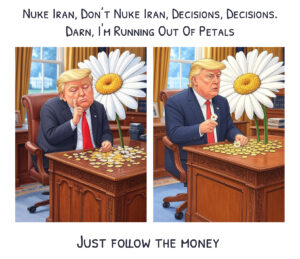
A strong case for impeachment (of any official, including a president) should include clear evidence of one or more of the following:
1. Abuse of Power
This is the most common and compelling impeachment charge. It refers to using public office for personal gain or to damage opponents.
Example basis:
Attempting to overturn election results through improper influence on state officials or Congress.
Using government resources or authority (e.g., the DOJ) to target political opponents.
These are not mere policy disagreements—they challenge the integrity of the democratic process.
2. Obstruction of Justice
Interfering with investigations—especially into one’s own conduct—can be grounds for impeachment. While obstruction can be criminal, even non-criminal interference with the justice system may qualify.
Example basis:
Encouraging witnesses not to testify.
Attempting to impede or shut down investigations into official wrongdoing.
3. Corruption or Bribery
Direct personal benefit from public office—whether through foreign deals, shady business interests, or misuse of campaign funds—can meet the constitutional standard.
Example basis:
Accepting or soliciting gifts, money, or favors from foreign governments or domestic actors in exchange for influence or policy changes.
4. Incitement to Violence or Insurrection
Encouraging or failing to stop violent or illegal actions by supporters—especially when in a position to do so—is extremely serious.
Example basis:
Using inflammatory language to incite a mob to disrupt lawful government proceedings.
Standing by passively as violence unfolds when intervention was possible.
5. Undermining the Rule of Law
When a president systematically undermines institutions designed to ensure justice, oversight, or the peaceful transfer of power, the cumulative effect can justify impeachment.
Why This Matters
Impeachment is not about politics—it’s about accountability. It exists to prevent future harm, preserve democratic norms, and reinforce that no one—not even a president—is above the law.
This case isn’t dependent on party or personality—it’s about behavior, precedent, and constitutional duty. Whether you support or oppose impeachment in any given instance should come down to facts and fidelity to the rule of law, not tribal loyalty.


Should we support Ukraine?

The real issue is this:
Should the world tolerate Putin’s violent, revisionist imperialism?
When framed that way, Ukraine is not just a recipient of aid. It’s the front line of a much larger confrontation—between authoritarian conquest and international law, between aggression and accountability.

Here’s how to break that reframing down:
It’s Not About “Supporting Ukraine”
That sounds like a moral favor.
This is about stopping a pattern of behavior that, if left unchecked, will extend beyond Ukraine’s borders—and possibly beyond Europe.
It’s About Putin’s Pattern
Crimea (2014): Annexed by force, no meaningful consequences.
Georgia (2008): Partial occupation, same story.
Ukraine (2022): Full-scale invasion, mass atrocities, targeting civilians.
Next? Moldova? The Baltics? NATO states?
Putin has publicly stated that the collapse of the Soviet Union was a tragedy and that he intends to “restore” Russian greatness. This is not bluster—it’s a blueprint.
Precedent Matters
If Russia is allowed to carve up Ukraine or drag it into permanent instability, what message does that send to:
China and its ambitions toward Taiwan?
Iran and its influence in the region?
Any authoritarian leader who sees violence as a way to solve political problems?
Cost Now vs. Cost Later
Yes, aid to Ukraine is expensive. But letting Putin succeed is far more costly—in blood, destabilization, and possibly a direct NATO conflict down the line.
The Right Framing
So the question should be:
Do we stop Putin now, or deal with the consequences of appeasement later?
Because this isn’t just about Ukraine’s sovereignty—it’s about whether modern democracies still have the spine to stand up to naked aggression.
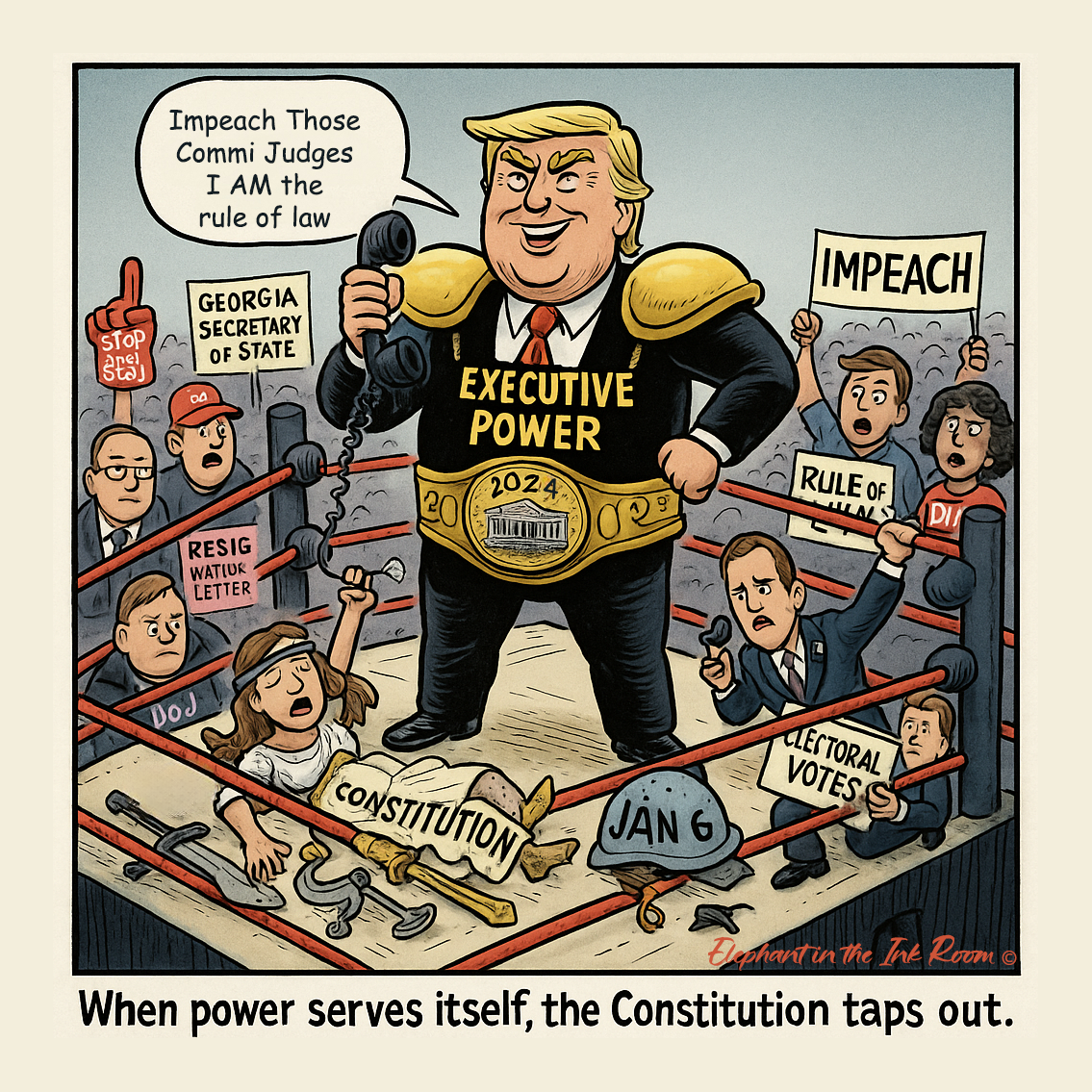
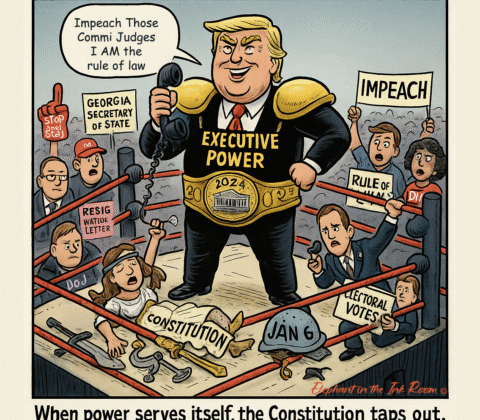
When Power Serves Itself: The Case for Impeaching Donald Trump

When Power Serves Itself: The Case for Impeaching Donald Trump
Impeachment isn’t meant to settle political scores. It’s a constitutional safeguard for when a public official—especially the president—uses the power of office not to serve the nation, but to protect and advance themselves.
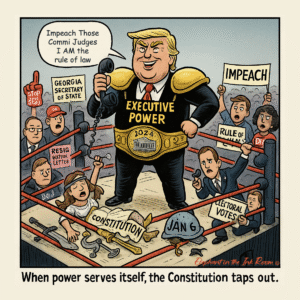
In the case of Donald J. Trump, the most applicable and alarming justification for impeachment is abuse of power.
This isn’t about disagreeing with his policies or personality. It’s about a pattern of conduct that shows a willingness—time and again—to bend the instruments of government toward personal interest, rather than public duty.
Key Examples of Abuse
1. Pressuring Election Officials
After losing the 2020 election, Trump pressured Georgia Secretary of State Brad Raffensperger to “find 11,780 votes”—exactly enough to overturn the state’s results. This wasn’t an inquiry; it was an attempt to weaponize state power to reverse the outcome of a free election.
2. Orchestrating Fake Electors
Trump and his allies helped promote slates of fraudulent electors in multiple states—people who falsely claimed to represent the will of voters. This plan was designed to disrupt the Electoral College and keep Trump in office regardless of the vote.
3. Undermining the DOJ
He repeatedly leaned on the Department of Justice to validate baseless claims of voter fraud and later considered replacing leadership with loyalists willing to do so. The DOJ is supposed to serve the law, not the president’s political goals.
4. Inciting the Capitol Insurrection
On January 6, 2021, Trump urged a crowd to march on the Capitol, insisting they “fight like hell” to stop the certification of the election. When violence erupted, he delayed taking any meaningful action to stop it—watching as lawmakers fled for their safety.
5. Retaliation Against Critics
From career civil servants to whistleblowers, Trump repeatedly fired or attacked individuals who challenged him, including ambassadors and inspectors general—gutting internal accountability structures meant to protect democratic norms.
Why It Matters
These aren’t isolated incidents. They form a consistent pattern of using presidential power to remain in power, avoid consequences, and punish dissent. That’s the textbook definition of abuse.
Trump has already been impeached twice—once for soliciting foreign interference in a U.S. election, and once for inciting insurrection. That he remains a political contender, and possibly a future president, makes accountability not just relevant, but essential.
Impeachment isn’t a partisan weapon. It’s the last-resort tool the Constitution provides to defend democracy from those who treat public power as a private shield.
The bar is high—but Trump cleared it, more than once.
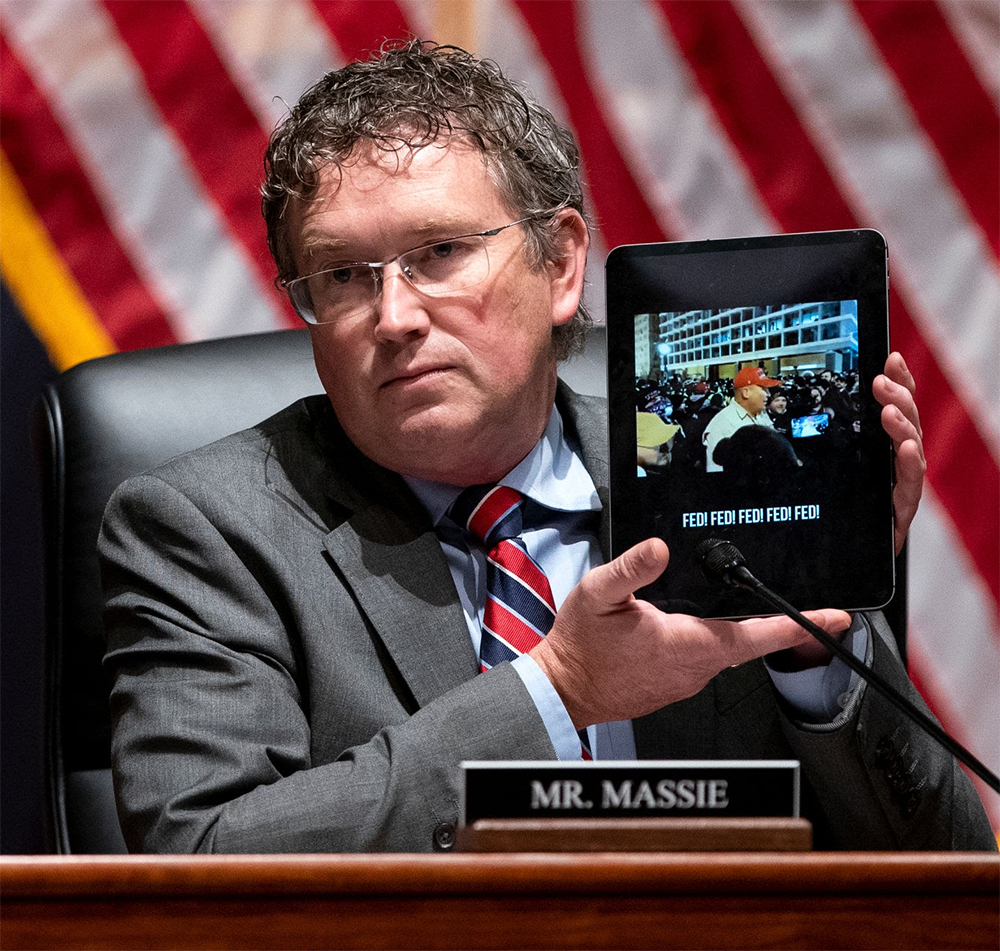
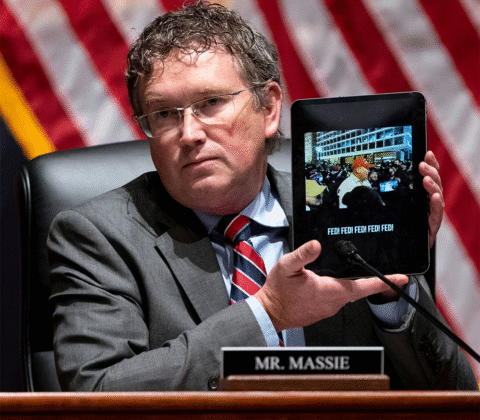
Thomas Massie (R-KY) calls for an end to the Federal Reserve. Why?
Thomas Massie (R-KY), a libertarian-leaning Republican, has long advocated for abolishing or dramatically reforming the Federal Reserve. His reasons for calling for an end to the Fed stem from several ideological and economic beliefs:
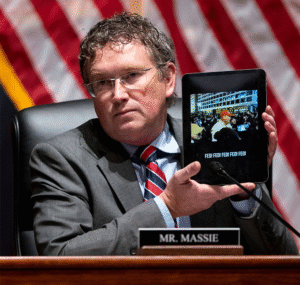
1. Lack of Transparency
Massie argues that the Federal Reserve operates with too much secrecy. He has supported legislation like the “Audit the Fed” bill (originally championed by Ron Paul) to bring more accountability and transparency to its operations. He believes Americans should know more about how the Fed sets monetary policy and manages trillions in assets.
2. Unconstitutional Monetary Authority
Massie holds a strict interpretation of the Constitution and often claims the Fed has usurped powers not granted by the founding document. He believes that the Constitution grants Congress the power to coin money and regulate its value—not to delegate that power to an independent central bank.
3. Inflation and Currency Devaluation
Like many critics of the Fed, Massie argues that its policies—especially low interest rates and quantitative easing—debase the dollar and lead to inflation. He views this as a hidden tax on Americans, especially the poor and those on fixed incomes.
4. Distortion of Free Markets
Massie believes the Fed distorts the free market by manipulating interest rates, which he sees as a form of central planning. He argues this creates artificial booms and busts and misallocates capital, contributing to cycles of economic instability.
5. Opposition to Government Overreach
Philosophically, Massie is a small-government conservative. He views the Federal Reserve as a key pillar of centralized government control over the economy. By dismantling the Fed, he believes monetary power could be returned to the people—possibly through a return to commodity-backed currency or market-based alternatives.
6. Debt Monetization
He is highly critical of how the Fed enables deficit spending by purchasing government debt. In his view, this removes fiscal discipline from Congress and allows for runaway national debt.
In short, Massie’s call to end the Fed aligns with a broader libertarian critique: that the Federal Reserve is unaccountable, unconstitutional, inflationary, and harmful to a truly free market. Whether one agrees or not, his position is rooted in a coherent ideological framework that’s been shared by figures like Ron Paul and the Austrian school of economics.

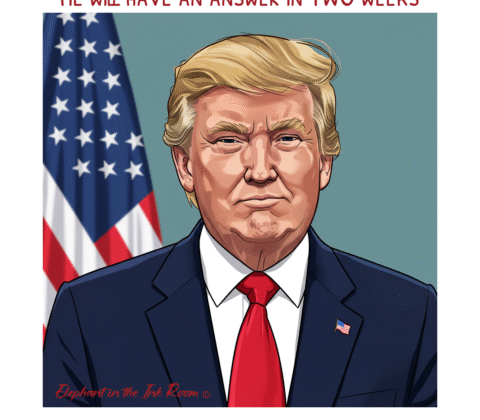
Two Weeks, the Greatest plan will be ready in Two Weeks

Two Weeks, the greatest plan will be ready in Two Weeks.
Well he finally admitted it. He called you stupid. Why stupid? because you keep falling for ‘in two weeks, the greatest plan ever’.
1. Health Care Plan: Throughout his first term and subsequent campaigns, Trump frequently promised to release a comprehensive health care plan to replace the Affordable Care Act (ACA). He often claimed this plan would be unveiled “in two weeks” or shortly after, but no detailed, actionable plan was ever presented.
2. Infrastructure Plan: Trump repeatedly promised a major infrastructure plan or deal to address the nation’s roads, bridges, and other infrastructure needs. Despite claims that details would be revealed soon, often within “two weeks,” no comprehensive infrastructure legislation or plan was delivered during his first term.
3. Tax Returns: Trump promised multiple times to release his income tax returns, often stating they would be made public soon. These promises, some of which were tied to a “two-week” timeline, were never fulfilled, with Trump citing ongoing audits as a reason for the delay.
4. Border Wall Paid for by Mexico: During his 2016 campaign and presidency, Trump promised to build a border wall along the U.S.-Mexico border, with Mexico covering the costs. Despite repeated assurances, including timelines suggesting progress within weeks, Mexico did not fund the wall, and only limited sections were constructed, primarily with U.S. taxpayer money.
5. Trade War with China: Trump claimed a “winnable” trade war with China would yield quick results, with some promises suggesting significant progress within weeks. While tariffs were imposed, the trade war led to mixed economic outcomes, with no clear resolution or victory as promised.
6. Lower Drug Prices: Trump pledged to lower prescription drug prices, with some statements indicating action within a short timeframe. While he signed the Know the Lowest Price Act and the Patient Right to Know Drug Prices Act, no broad, systemic reduction in drug prices materialized as promised.
7. Ending the Russia-Ukraine War: During his 2024 campaign and early second term, Trump claimed he could end the Russia-Ukraine war quickly, including giving Russian President Vladimir Putin “two weeks” to act. As of mid-2025, no concrete actions or resolutions have been reported, and the conflict continues.
8. Ending the War in Gaza: Trump promised swift action to resolve the Israel-Gaza conflict, with some statements suggesting progress within weeks. No significant progress or resolution has been achieved as of the latest updates.
9. TikTok Deal or Ban: Trump mentioned resolving the status of TikTok, either through a deal or a ban, with a timeline suggesting action soon. As of June 2025, no final resolution has been reported.
10. Lower Grocery Prices: Trump promised to address rising grocery prices quickly, but no specific policies or outcomes have been reported to achieve this goal within the promised timeframe.
11. Denuclearization of North Korea: Trump claimed progress on denuclearizing North Korea would be swift, with some timelines suggesting breakthroughs within weeks. Despite high-profile summits, no significant denuclearization occurred.
12. Pandemic Resolution: In 2020, Trump claimed the COVID-19 pandemic would “disappear” soon, including by April 2020, but the pandemic persisted far beyond the promised timeline.
13. Melania Trump’s Immigration Papers: Trump promised to provide documentation regarding Melania Trump’s immigration status within “two weeks,” but these documents were never released. But when they did appear, we discovered that she got fast tracked, Einstein status, that’s debatable, Yes she did marry a Billionaire, But No, she married Donald Trump. You decide.
Is this something your comfortable with? Knowing that you will never know and the only plan that he really has is for himself.
Trump thinks you have an attention span considerably less than two weeks. We have seen him time and time again tell us in ‘two weeks’ .
We can do something about this, yes, we can. Call him on that topic, over and over again, tell him ‘two weeks’ isn’t good enough.

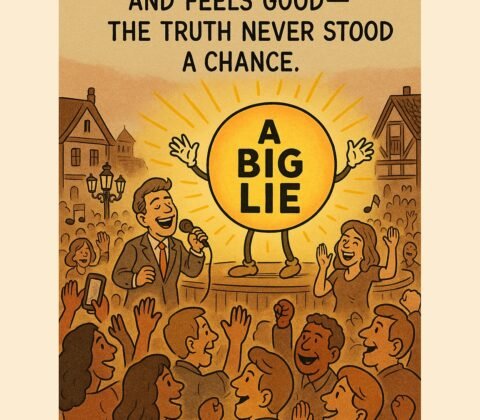
“Admitting I was fooled would mean admitting I was wrong — and I can’t do that.”

It’s one of the most troubling and fascinating questions of our time — and it speaks to the psychology of belief more than just logic or fact.
Here’s a breakdown of why people believe obvious lies:
1. Identity Over Accuracy
People tend to prioritize group identity over objective truth. If a belief signals loyalty to a group they value (political, religious, cultural), they will often defend it — even when it’s demonstrably false.
Example: “If my tribe says the sky is green, then saying it’s blue makes me a traitor.”
2. Repetition Breeds Belief
Even obvious lies, when repeated enough, start to feel true. This is known as the illusory truth effect. The more often we hear something — even if it’s absurd — the more familiar and comfortable it feels.
“I don’t know why I believe it… I’ve just heard it so many times.”
3. Emotion Beats Reason
Lies that appeal to fear, anger, or hope override logic. Emotionally charged stories activate the parts of the brain responsible for survival and intuition — not careful analysis.
“It just feels true. I don’t need proof.”
4. Cognitive Dissonance
People resist facts that contradict their worldview because it creates psychological discomfort. Believing the lie becomes easier than facing the possibility that they were wrong all along.
“Admitting I was fooled would mean admitting I was wrong — and I can’t do that.”
5. Mistrust of Institutions
When trust in media, science, or government erodes, people turn to alternative sources — often unvetted or manipulative ones. Lies seem more credible in a world where nothing seems trustworthy.
“Everyone lies anyway. At least this guy seems honest.”
6. Social Reinforcement
People are heavily influenced by what others around them believe. If everyone in their circle buys the lie, challenging it can mean isolation, ridicule, or conflict.
“I’d rather be wrong with them than right and alone.”
7. The Lie Is Convenient
Sometimes the lie is just easier, simpler, or more emotionally satisfying than the truth. Especially if the truth is complicated, painful, or undermines one’s self-image or worldview.
“It’s not that I believe it… I just like what it lets me believe about myself.”
If you’re seeing this dynamic in politics, media, or personal conversations — you’re not alone. This is where misinformation gains power: not through logic, but through human psychology.


The High Cost of Harsh Immigration Enforcement

The High Cost of Harsh Immigration Enforcement
Recent immigration policies have aggressively tightened borders and expanded enforcement efforts, but the human and societal costs are profound. The use of mass raids and detentions — often described as paramilitary operations — has sowed fear and mistrust in immigrant communities. These tactics disrupt families, undermine due process, and raise serious questions about civil rights and humane treatment.
While border security is a legitimate priority, enforcement must be balanced with respect for human dignity and the rule of law. Policies that prioritize harshness over compassion risk alienating vulnerable populations and weakening social cohesion. True security comes not from intimidation and separation, but from thoughtful, fair, and effective immigration reform.
What Trump’s Immigration Policies Have Actually Accomplished

1. Reduced Legal Immigration Levels:
The Trump administration implemented stricter visa restrictions and reduced refugee admissions significantly. Caps on asylum claims and travel bans on several majority-Muslim countries also curtailed legal immigration flows.
2. Tougher Border Enforcement:
There was a strong emphasis on “zero tolerance” policies leading to family separations at the border, increased border wall construction, and heightened use of detention facilities.
3. Expanded ICE Enforcement:
ICE ramped up raids and deportations targeting undocumented immigrants, including those with minor offenses or no criminal records. This aggressive enforcement fueled widespread fear among immigrant communities.
4. Public Backlash and “ICE-Gestapo” Criticism:
Critics and immigrant advocates accused ICE of acting like a paramilitary “Gestapo,” citing reports of harsh raids, lack of due process, and aggressive tactics. This rhetoric highlighted the deep mistrust and fear generated by enforcement methods.
5. Impact on Communities and Economy:
The policies disrupted immigrant families, led to legal challenges, and created uncertainty for workers in industries reliant on immigrant labor. Some industries reported labor shortages and economic strain due to stricter enforcement.
Summary
Trump’s immigration policies effectively tightened borders and reduced immigration numbers but at the cost of humanitarian concerns, legal challenges, and increased social polarization. The aggressive ICE tactics, often described by critics with terms like “Gestapo,” deepened fear and trauma within immigrant communities and sparked intense debate about the balance between enforcement and human rights.
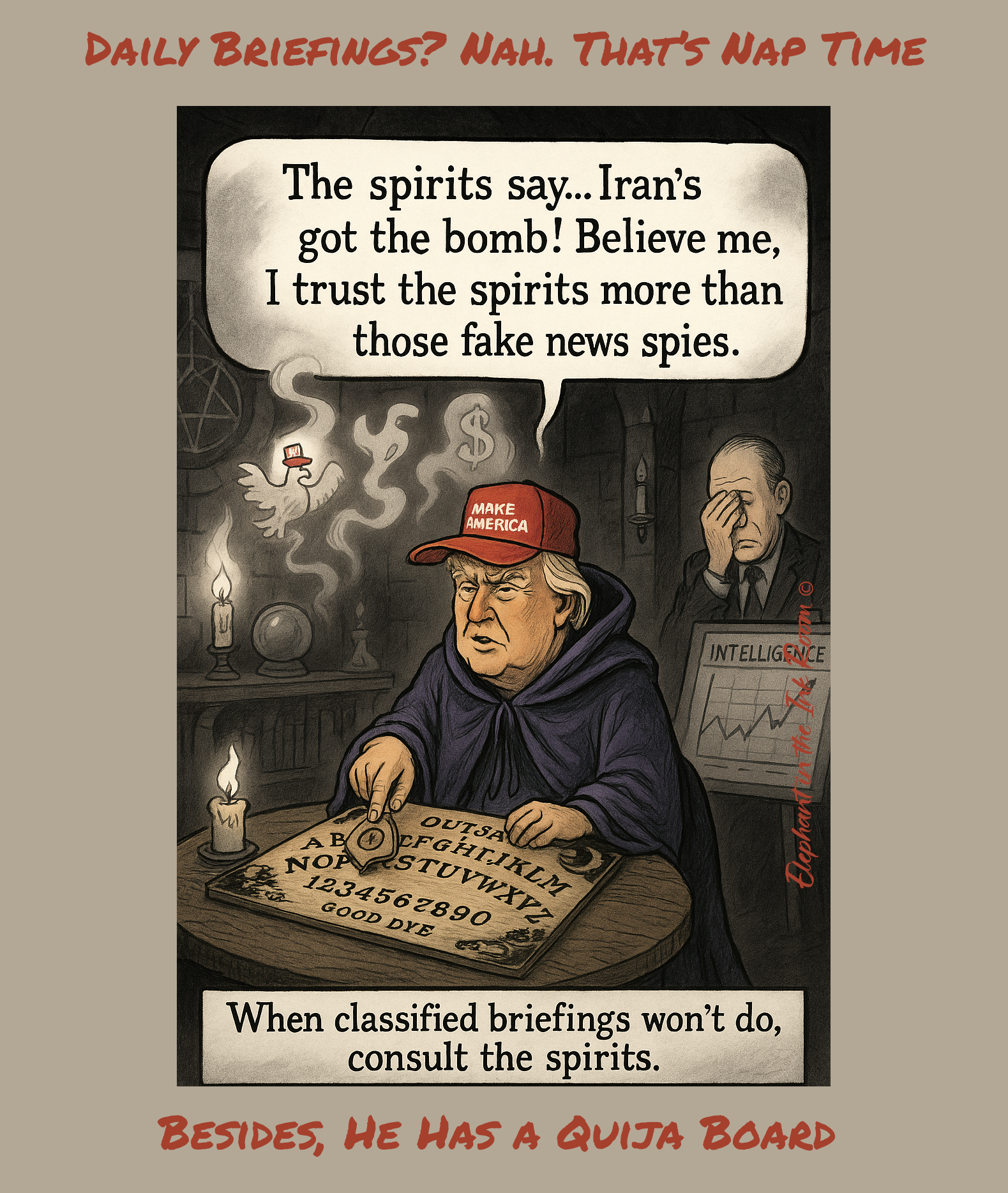
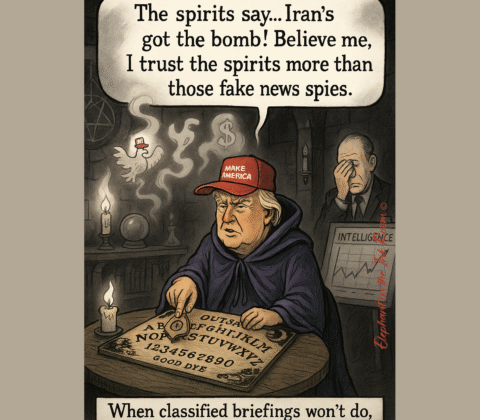
The Oracle of Alternate Intelligence

The Oracle of Alternate Intelligence

In a time when credible intelligence is vital to the safety and stability of the nation, it is deeply troubling to witness leadership that favors superstition and spectacle over facts and expertise. Instead of placing trust in the dedicated professionals of the intelligence community, we see a disturbing pattern of turning to unreliable sources — from internet influencers to conspiracy theories — for guidance on matters of grave consequence.
This cartoon captures the absurdity of a reality where official briefings and classified reports are cast aside, replaced by a symbolic Ouija board, representing the mystical and ungrounded “intelligence” that some choose to believe. When critical decisions about national security depend more on the whims of viral misinformation and less on verified evidence, the consequences can be catastrophic.
Leadership demands discernment, respect for expertise, and a commitment to truth — qualities that seem increasingly in short supply. The national interest suffers when elected officials prioritize their echo chambers over established facts, fueling confusion and undermining public trust.
The “Oracle of Alternate Intelligence” is more than satire; it is a stark warning. Our security and future depend on the courage to face reality head-on, not to seek answers from shadows and illusions.
Key Agencies within the US Intelligence Community:
Central Intelligence Agency (CIA):
.
Focuses on gathering human intelligence (HUMINT) and conducting covert operations abroad.
National Security Agency (NSA):
.
Primarily responsible for signals intelligence (SIGINT) and cybersecurity, protecting U.S. national security systems.
Defense Intelligence Agency (DIA):
.
Provides military intelligence to the Department of Defense and other government agencies.
National Geospatial-Intelligence Agency (NGA):
.
Manages geospatial intelligence (GEOINT) and provides geographic information for national security and defense.
National Reconnaissance Office (NRO):
.
Develops, acquires, and operates reconnaissance satellites for intelligence gathering.
Federal Bureau of Investigation (FBI):
.
While primarily a law enforcement agency, the FBI also has an intelligence component focused on domestic and international threats.
Office of the Director of National Intelligence (ODNI):
.
Leads and integrates the IC, ensuring coordination and consistency among the various agencies.
Department of Homeland Security (DHS):
.
Has an intelligence component focused on threats to homeland security.
Department of Energy (DOE):
.
Focuses on intelligence related to energy security and nuclear weapons.
Department of State (DoS):
.
Provides intelligence analysis on foreign policy and international relations.
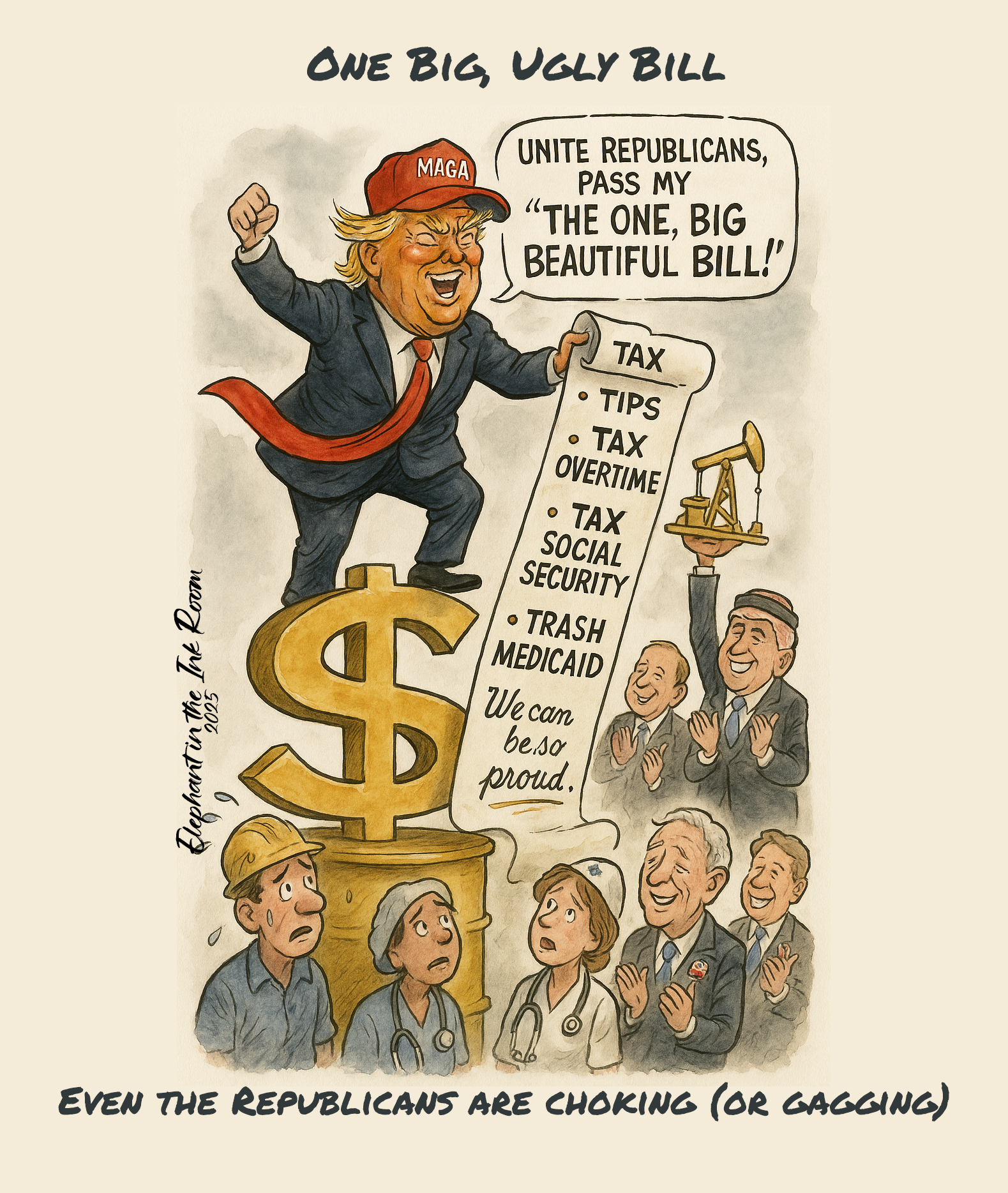
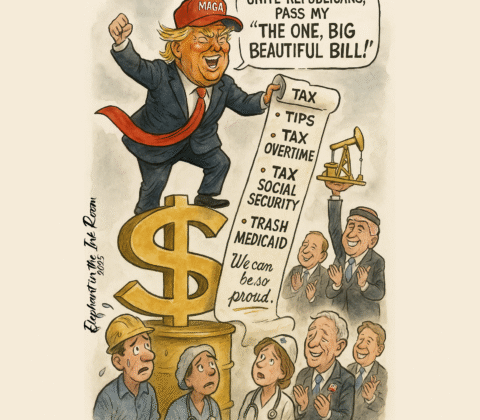
Trump’s “Big, Beautiful” Healthcare Plan Passed — What Happened

My Original what if posting
This is not about all the additional spending and Federal Debt, It’s about how we are going to be affected Healthwise. As of July 15th 2925
Deep Medicaid cuts & new requirements
Roughly $1 trillion in Medicaid budget cuts over the next decade
Work requirements: able-bodied adults must complete 80 hours/month of work, school, or community service
Coverage losses expected: around 7.8 million uninsured by 2034
ACA Marketplace changes
Elimination of enhanced premium tax credits, phasing out the COVID-era boosts
Automatic re-enrollment ends; enrollees need annual verification starting 2027
Enrollment window shortened; premiums likely to rise from a smaller risk pool
Rural healthcare impact
Over 300 rural hospitals may close, more than 700 at risk
Includes a $50 billion Rural Health Transformation fund from 2026–2030
Private insurers feel the squeeze
Insurers reliant on Medicaid/Medicare seeing profits drop; some re-plan or exit markets
What It Could Mean for You
Group Likely Impact
Group |
Likely Impact |
|---|---|
Low-income individuals/families |
Reduced Medicaid coverage, higher out-of-pocket costs, risk of losing care |
Marketplace enrollees |
Less subsidy support, tighter enrollment rules, higher rates |
Rural communities |
Potential loss of local hospitals and services |
Insurers |
Margins under pressure—could affect availability and competition |
Why There’s No “Trump Healthcare Plan” in the Bill
Trump campaigned on building a “big, beautiful healthcare plan,” but this legislation is not a substitute healthcare blueprint. Instead, it:
-
Cuts funding and restructures access.
-
Does not detail a replacement model with insurance standards.
-
Lacks cost or coverage analyses tied to a specific proposal.



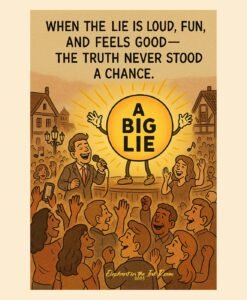


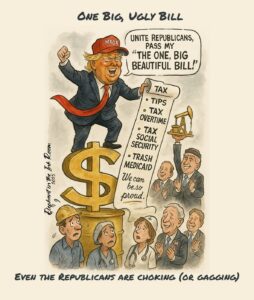
The Land Baron’s War: When Foreign Policy Becomes a Private Game
The Land Baron’s War: When Foreign Policy Becomes a Private Game
In the growing tension between the U.S., Israel, and Iran, there’s a disturbing pattern emerging—and at the center of it is Donald Trump. Not acting as a head of state. Not as a strategist. But as a rogue land baron, pulling strings for personal and political gain, with little regard for institutional process or long-term consequences.
This isn’t diplomacy. It’s unchecked manipulation of global conflict.
According to recent reporting, Trump has escalated pressure for potential action against Iran—not through formal coordination with U.S. military or intelligence agencies, but through private channels with Israeli leadership. And much like his past foreign policy moves, this play appears guided more by ego, impulse, and election politics than by national security strategy.
We’ve seen this before. In 2020, just weeks before leaving office, Trump seriously considered striking Iran’s nuclear facilities. It took high-ranking officials to talk him down. Today, those guardrails seem absent, and the MAGA apparatus he now commands looks far more willing to go along for the ride.
What makes this so dangerous isn’t just Trump’s disregard for process—it’s his bypassing of American checks and balances altogether. The Pentagon? Sidelined. Congress? Not consulted. NATO allies? Out of the loop. Instead, he’s dealing in foreign aggression as if it’s a private oil deal, directing proxies like a man playing with matchsticks in a field of dry grass.
Meanwhile, loyalists like Pete Hegseth and the MAGA media machine cheerlead potential war, not out of duty, but out of loyalty to a man who views international conflict as a chessboard for self-image.
Let’s be clear: coordinating strikes with a foreign nation while excluding your own defense institutions isn’t policy—it’s paranoia in action. It’s a vigilante doctrine where the only strategy is spectacle, and the only goal is control.
And if history teaches us anything, it’s this: the cost of impulsive war is never paid by the land baron. It’s paid by the people living under the rubble.
Share this:
Like this: